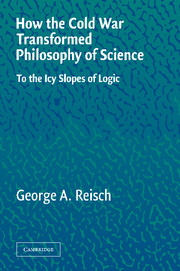Book contents
- Frontmatter
- Contents
- Preface and Acknowledgments
- 1 An Introduction to Logical Empiricism and the Unity of Science Movement in the Cold War
- 2 Otto Neurath, Charles Morris, Rudolf Carnap, and Philipp Frank: Political Philosophers of Science
- 3 Leftist Philosophy of Science in America and the Reception of Logical Empiricism in New York City
- 4 “Doomed in Advance to Defeat”? John Dewey on Reductionism, Values, and the International Encyclopedia of Unified Science
- 5 Red Philosophy of Science: Blumberg, Malisoff, Somerville, and Early Philosophy of Science
- 6 The View from the Left: Logical Empiricism and Radical Philosophers
- 7 The View from the Far Left: Logical Empiricism and Communist Philosophers
- 8 Postwar Disillusionment, Anti-Intellectualism, and the Values Debate
- 9 Horace Kallen's Attack on the Unity of Science
- 10 Creeping Totalitarianism, Creeping Scholasticism: Neurath, Frank, and the Trouble with Semantics
- 11 Frank's Neurathian Crusade: Science, Enlightenment, and Values
- 12 “A Very Fertile Field for Investigation”: Anticollectivism and Anticommunism in Popular and Academic Culture
- 13 Anticommunist Investigations, Loyalty Oaths, and the Wrath of Sidney Hook
- 14 Competing Programs for Postwar Philosophy of Science
- 15 Freedom Celebrated: The Professional Decline of Philipp Frank and the Unity of Science Movement
- 16 The Marginalization of Charles Morris
- 17 Values, Axioms, and the Icy Slopes of Logic
- 18 Professionalism, Power, and What Might Have Been
- References
- Index
16 - The Marginalization of Charles Morris
Published online by Cambridge University Press: 21 January 2010
- Frontmatter
- Contents
- Preface and Acknowledgments
- 1 An Introduction to Logical Empiricism and the Unity of Science Movement in the Cold War
- 2 Otto Neurath, Charles Morris, Rudolf Carnap, and Philipp Frank: Political Philosophers of Science
- 3 Leftist Philosophy of Science in America and the Reception of Logical Empiricism in New York City
- 4 “Doomed in Advance to Defeat”? John Dewey on Reductionism, Values, and the International Encyclopedia of Unified Science
- 5 Red Philosophy of Science: Blumberg, Malisoff, Somerville, and Early Philosophy of Science
- 6 The View from the Left: Logical Empiricism and Radical Philosophers
- 7 The View from the Far Left: Logical Empiricism and Communist Philosophers
- 8 Postwar Disillusionment, Anti-Intellectualism, and the Values Debate
- 9 Horace Kallen's Attack on the Unity of Science
- 10 Creeping Totalitarianism, Creeping Scholasticism: Neurath, Frank, and the Trouble with Semantics
- 11 Frank's Neurathian Crusade: Science, Enlightenment, and Values
- 12 “A Very Fertile Field for Investigation”: Anticollectivism and Anticommunism in Popular and Academic Culture
- 13 Anticommunist Investigations, Loyalty Oaths, and the Wrath of Sidney Hook
- 14 Competing Programs for Postwar Philosophy of Science
- 15 Freedom Celebrated: The Professional Decline of Philipp Frank and the Unity of Science Movement
- 16 The Marginalization of Charles Morris
- 17 Values, Axioms, and the Icy Slopes of Logic
- 18 Professionalism, Power, and What Might Have Been
- References
- Index
Summary
If the demise of Frank's institute and influence in the profession helps to explain the eventual dominance of the apolitical, professional agenda in philosophy of science, then some explanatory weight must be placed also on the decline of Charles Morris. As discussed in chapter 2, Morris staked his career on outlining a future science of semiotics that would synthesize the best aspects of logical empiricism and pragmatism and function as an organon for the development of a modern, democratic, and scientifically enlightened world culture. While Frank and the institute were declining, therefore, one might expect that Morris would have come to their aid. But Morris's own star had fallen. Because of his enthusiasm for blending Sheldon's somatotype theory with his philosophical research and the because of widely recognized problems with his major book Signs, Language, and Behavior (1946), Morris had less prestige in philosophy and admiration from his colleagues than he did in the 1930s.
Signs, Language, and Behavior
Morris's goal in Signs, Language, and Behavior was to establish a collection of terms for a future science of semiotic that would analyze sign processes in an objective, behavioristic manner. Examples include, obviously, “sign,” “behavior,” and “denotatum,” as well as other terms that Morris defines on their basis. These include “formator” and “formatum,” “pathic sign,” “descriptor,” “designator,” and “determinor.” One problem with the book was Morris's wooden, passive, and soporific style of writing. Morris's most aggressive critic, Arthur Bentley, could not help but poke fun in this regard:
Consider the following: “For something to be a sign to an organism … does not require that the organism signify that the something in question is a sign, for a sign can exist without there being a sign that it is a sign. […]
- Type
- Chapter
- Information
- How the Cold War Transformed Philosophy of ScienceTo the Icy Slopes of Logic, pp. 331 - 343Publisher: Cambridge University PressPrint publication year: 2005



